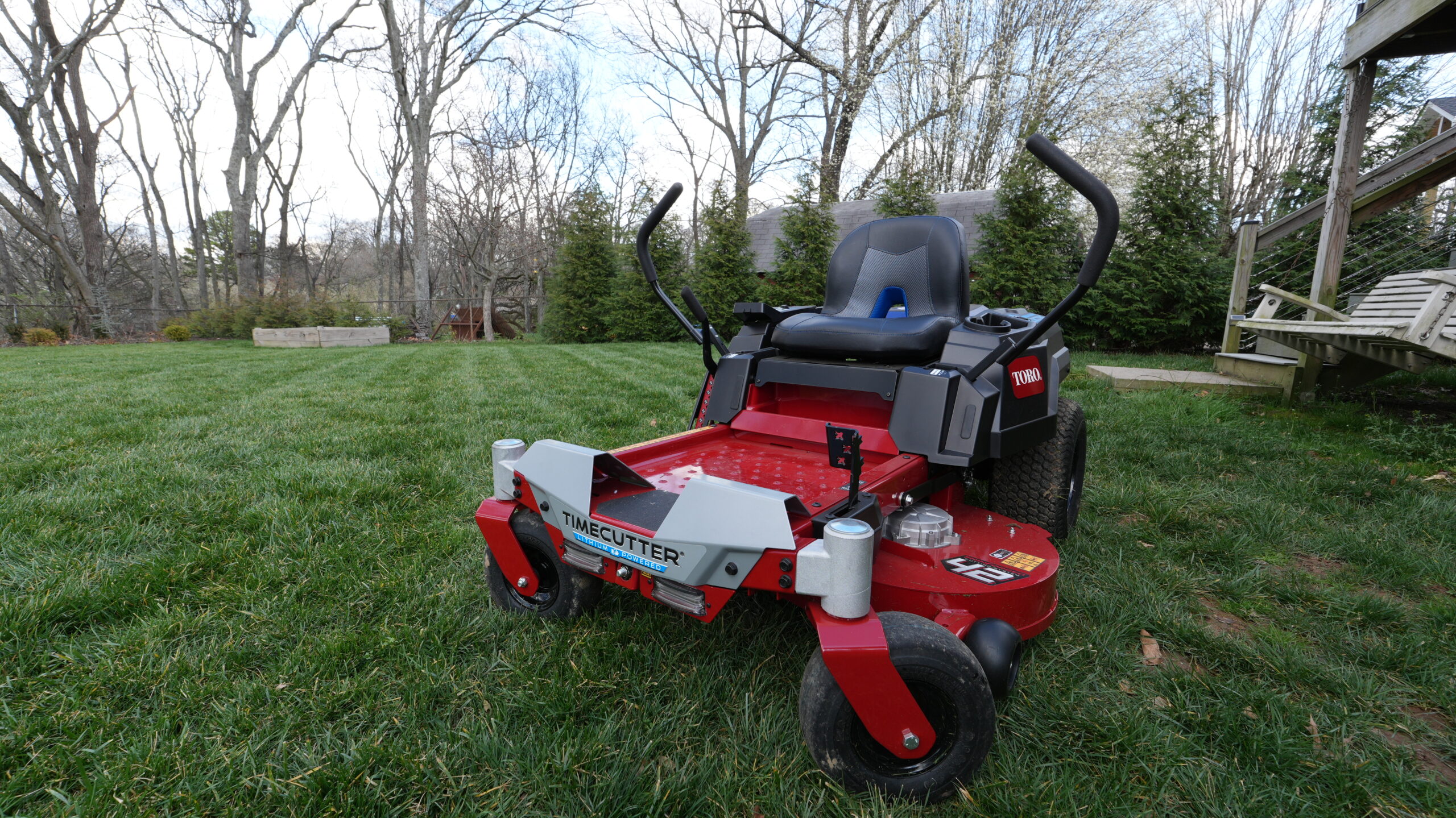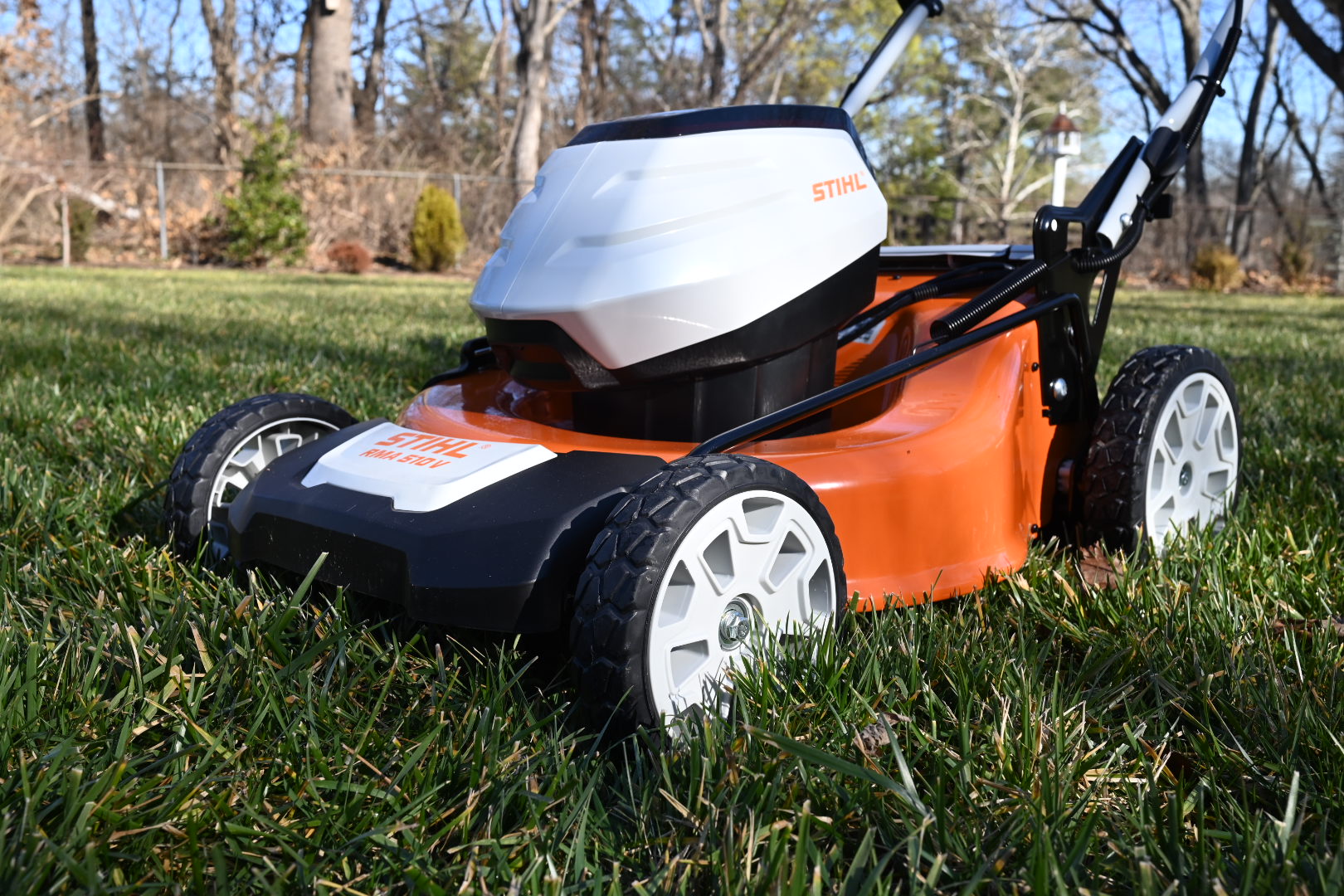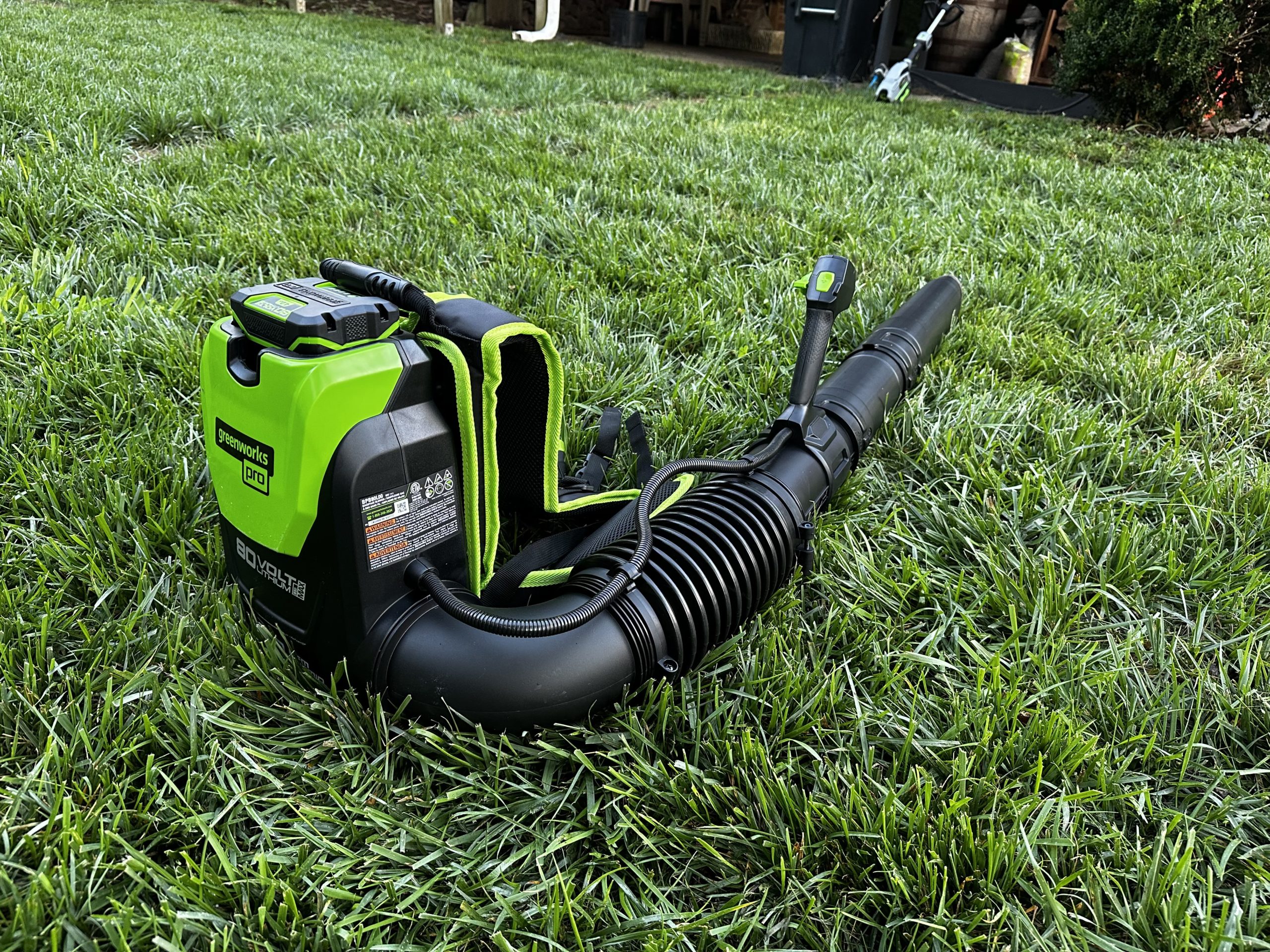Gas and battery powered leaf blowers used to not even be remotely comparable. Now…I’m not so sure. I’ve used both types for decades and have come to change my mind on which is better.
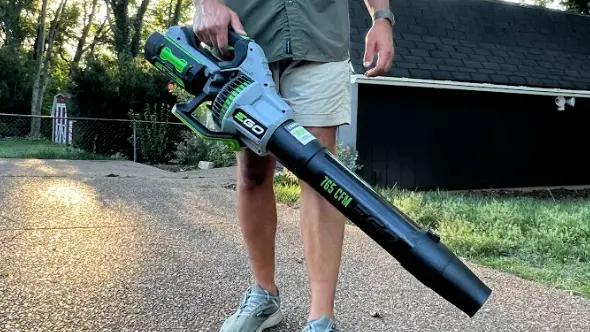
You see advancements in modern technology (Teslas, etc.) have made battery powered lawn tools really competitive. But there’s still something just flat out reliable about the power and experience you get with a gas-powered leaf blower.
Today – I am here to not necessarily settle the debate, but tell you about my experience using and testing dozens of different leaf blowers. You can check out many of these on my Youtube channel.
My experience testing gas and battery powered leaf blowers
I’ve been a lifelong gas powered leaf blower user. I’ve been loyal to my trusty old Stihl BG 86 C handheld blower for a really long time. For more power, I’ve used my earth shattering (and ear shattering) Stihl BR 600 backpack leaf blower.
Needless to say, they’ve been hard to give up. But one year for Christmas my mom got me this tiny handheld Kimo blower – which was battery-powered. I didn’t understand when or how I would use it, but then became addicted. It was great for quickly blowing off my walkway and porch before guests came over – without smelling like gas.
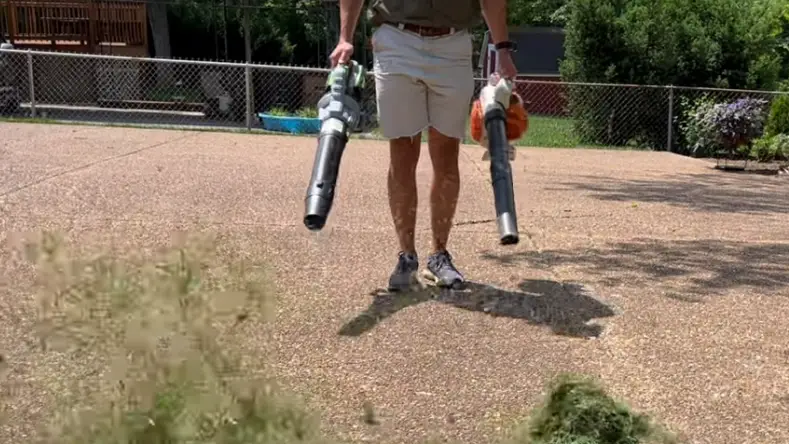
My next purchases were huge steps up – the EGO 56V 765 CFM blower and the Ryobi 40V Whisper series blower. These completely blew me away. Electric blowers with just as much (if not more) power than my gas blowers.
Needless to say, I’ve made the switch. And the nicest part? Never smelling like gas, never having to do maintenance, and never having to pull another cord.
Gas is notoriously more powerful
Okay – so I just mentioned that I had two battery powered leaf blowers that had equal power to most gas blowers. But here’s the simple truth: they are about the only ones with that much power.
Most battery powered leaf blowers fall in the 150 MPH range of air speed without about 300-400 CFMs. When it comes to gas blowers, especially backpack gas blowers, CFMs are the true metric to look at. CFMs are a better indicator of air volume and dictate the size of the air funnel. So while some backpack blowers have similar air speeds, they have CFMs well above 700 that push leaves like crazy.
Below is a cool chart that highlights the power differences among gas powered blowers. As you can see, backpack blowers have higher CFMs and MPH but are heavier, louder and more expensive.

Battery powered blowers actually have similar specifications. Although I’d say the median battery-powered blower is weaker than the median gas-powered blower. Battery blowers have a humongous range in CFM and MPH because they can either be really cheaply made or extremely nice.
Battery backpack blowers are much less common and in my opinion, not very advanced. In fact, I don’t really get the point of a lot of them – they look just like regular battery powered blowers and perform about the same.

Lastly, I want to get a word in for my often forgotten homies – corded electric blowers – that often don’t get the attention that others do. While they are often weaker, they are also sometimes really powerful and ALWAYS extremely cheap.
Comfort and usability on battery and gas blowers
When it comes to comfort and usability for battery and gas powered leaf blowers, I am a huge fan of battery-powered. There are a few things I really like about them that differentiate them from gas.
For starters, both gas and electric have variable speed triggers, cruise control, and just about every bell and whistle that is the same. But battery-powered blowers are so much easier to start and require no maintenance. For me, walking out to the shed and simply sliding in the battery to get started is way better than ensuring proper fuel mixture and cranking the cord.
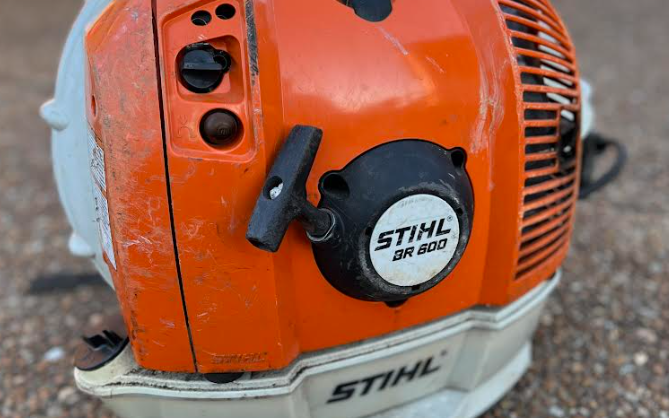
On the other hand, some of these new battery leaf blowers are HEAVY. My EGO blower is about 3 lbs heavier than my Stihl blower and both have similar power profiles and are handheld. That isn’t the case with all battery powered blowers, but the new super powerful ones all have a big motor and heavy batteries.
As far as user experience goes, the last piece I will harp on is how nice it is to have a blower that doesn’t put out any fumes. I don’t mind gasoline and I’m one of those people that likes how gas smells
Battery and gas leaf blowers cost about the same
Comparing costs across different blower types is a little tough. Battery powered blowers have a lot of variation in cost because some are cheap and weak and others are super strong.
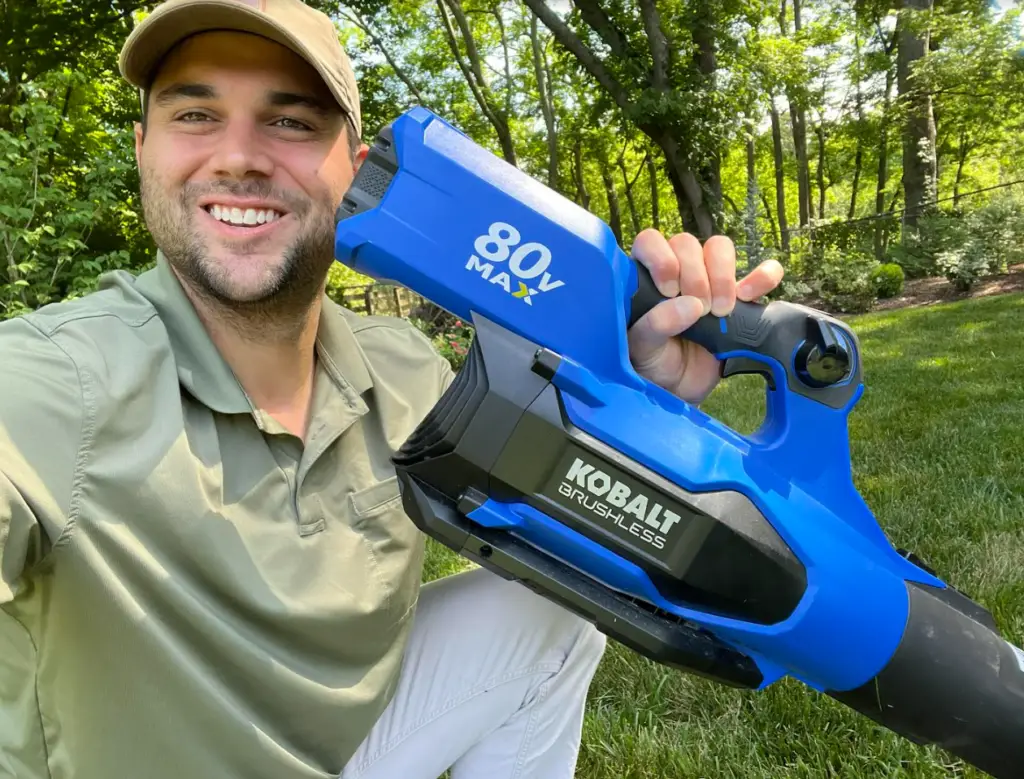
For a comparable cost evaluation, you want to find two blowers that have somewhat equal power. In the handheld blower world, I suggest the EGO 765 CFM battery powered blower. From the gas powered world, I think the Stihl BG 86 C is a great comparison. I happen to own both.
The EGO 765 CFM blower comes in at a great price with batteries. The Stihl BG 86 C is ironically the exact same price.
Hidden costs of gas powered blowers
Gas powered blowers require something that battery powered blowers don’t: gas (duh). While they don’t take a ton of gas, they do require occasional refills and mixing with oil. You also have to replace filters and spark plugs.
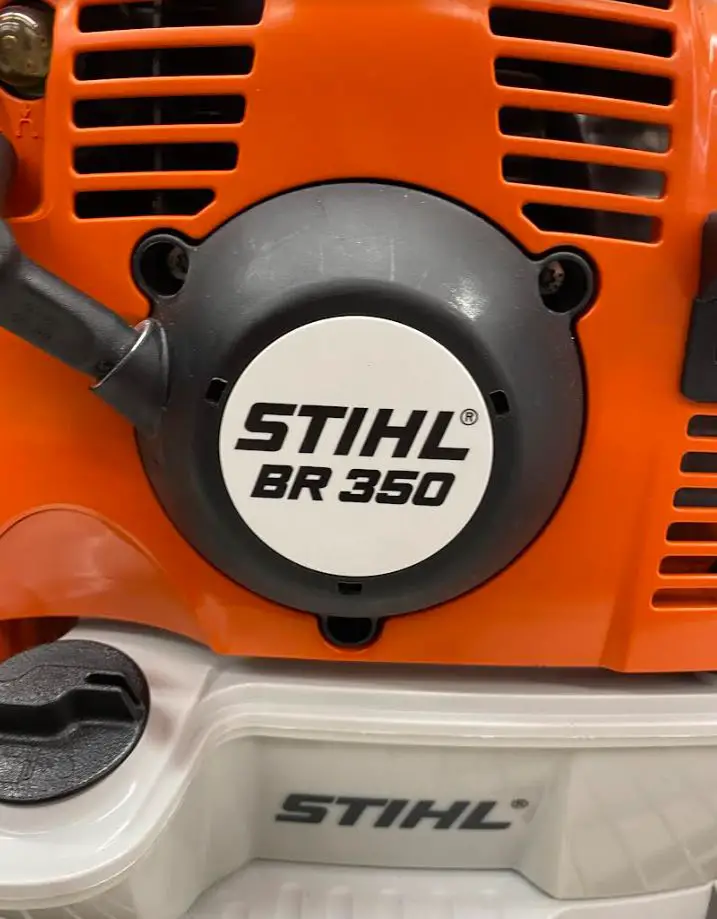
These costs aren’t significant, but compared with battery powered blowers, can add up over time.
Leaf blower noise level comparison: Gas vs Electric
Lastly – let’s compare the noise level on both gas and electric blowers.
Gas blowers are known for being super loud and obnoxious. I always knew this but learned it the hard way when my neighbor took out her backpack blower at 6am and woke one of my toddlers up.
Handheld gas blowers put out about 70 dB of noise and backpack blowers are closer to 100 dB of noise. At 100 dB of noise, a comparable sound is a subway train. That’s loud.
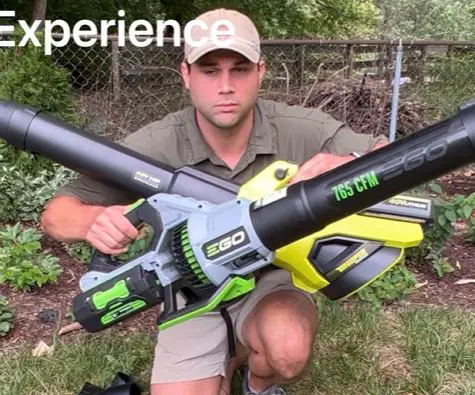
Battery powered blowers are certainly quieter, measuring in at about 50-60 dB. Now I know that isn’t as loud, but it isn’t pleasant either. Some battery powered blowers have a much higher pitch noise that is equally aggravating.
I think neighbors definitely appreciate battery powered blowers more than gas, but I would still wear ear protection with both.
CFMs and MPHs explained
CFM, or cubic feet per minute, is a measurement of the volume of air. This answers the question: how much air is moving through the leaf blower? While that seems like a weird question, it is super important for understanding the power of a blower. More on that in a second.
MPH, or miles per hour, is a measurement of speed. This answers the question: how fast does the air move through the blower?
CFM and MPH are related – generally the higher the CFM, the higher the MPH.
What to look for in a blower
Cordless blowers come in a bunch of shapes and sizes but there are three basic things you need to understand:
CFM
Cubic feet per minute. This is a measure of air output on the blower. Higher CFM = more power, but not necessarily more miles per hour. High CFM with a wide nozzle = lower MPH. High CFM with a narrow nozzle = high miles per hour. Ideally, you want both a high CFM with a narrow to medium nozzle for most residential jobs.
Usability
What is the point of having a blower if it is hard to use? Have to get one that is lightweight, easy to start, and has some functions that make your life easier.
Motor type
Brushless motors reign supreme. Cooler running motors with more torque, a longer run-time, and last many more years. Brushless is a no brainer when picking a blower.
These are three things you need to pay attention to when looking through the specifications.
Why I review lawn tools
The reason we started this website in the first place was because we had so much trouble trying to find reasonable, understandable, honest reviews for lawn equipment. And it’s not cheap! After hours and hours of research, trying products and returning them, and messing up our yards – we started this site.

As people who had to learn the hard way, we want you to know exactly what you are signing up for before you purchase a piece of equipment. That’s why we are committed to providing honest, easy-to-understand reviews that mean something.
Common questions I get
Is gas or electric better for leaf blowers?
Gas leaf blowers tend to be better for commercial work whereas electric and battery leaf blowers are better for home use.
What are the cons of a gas powered leaf blower?
Cons of gas powered leaf blowers include high noise levels, fumes, and maintenance schedules that make them much more complicated.
How long do batteries last on an electric leaf blower?
Batteries on electric leaf blowers generally last from 30 minutes to an hour depending on what speed you are running your blower. It also depends on the Amp-hours of the batteries.
Are electric leaf blowers less powerful?
Generally, electric leaf blowers are less powerful than gas. There are exceptions where a few electric blowers can go toe-to-toe with gas.
Is an electric leaf blower worth it?
Electric leaf blowers are worth their lower price if you are a homeowner and don’t want fumes or costly maintenance for your leaf blower.
What MPH is best for a leaf blower?
The ideal MPH for a leaf blower is generally above 140 MPH for home use and above 180 MPH for commercial use.

